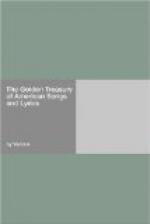What shapes the angels wear,
What is their guise and speech
In those lands beyond our reach,—
And his eyes behold
Things that shall never, never be to mortal hearers told.
E.C. STEDMAN.
At Last.[4]
When first the bride and bridegroom wed,
They love their single selves
the best;
A sword is in the marriage bed,
Their separate slumbers are
not rest.
They quarrel, and make up again,
They give and suffer worlds of pain.
Both
right and wrong,
They
struggle long,
Till some good day, when they are old,
Some dark day, when the bells are tolled,
Death having taken their best of life,
They lose themselves, and
find each other;
They know that they are husband, wife,
For, weeping, they are Father,
Mother!
R.H. STODDARD.
[4] From “The Poems of R.H. Stoddard,” copyright 1880, by Charles Scribner’s Sons.
“Thalatta.”
CRY OF THE TEN THOUSAND.
I stand upon the summit of my years.
Behind, the toil, the camp, the march,
the strife,
The wandering and the desert; vast, afar,
Beyond this weary way, behold! the Sea!
The sea o’erswept by clouds and
winds and wings,
By thoughts and wishes manifold, whose
breath
Is freshness and whose mighty pulse is
peace.
Palter no question of the dim Beyond;
Cut loose the bark; such voyage itself
is rest;
Majestic motion, unimpeded scope,
A widening heaven, a current without care.
Eternity!—Deliverance, Promise,
Course!
Time-tired souls salute thee from the
shore.
J.B. BROWN.
Gondolieds.
I.
YESTERDAY.
Dear yesterday, glide not so fast;
Oh, let me cling
To thy white garments floating past;
Even to shadows which they cast
I cling, I cling.
Show me thy face
Just once, once more; a single night
Cannot have brought a loss, a blight
Upon its grace.
Nor are they dead whom thou dost bear,
Robed for the
grave.
See what a smile their red lips wear;
To lay them living wilt thou dare
Into a grave?
I know, I know,
I left thee first; now I repent;
I listen now; I never meant
To have thee go.
Just once, once more, tell me the word
Thou hadst for
me!
Alas! although my heart was stirred,
I never fully knew or heard
It was for me.
O yesterday,
My yesterday, thy sorest pain
Were joy couldst thou but come again,—
Sweet yesterday.
Venice, May 26.
II.
TO-MORROW.




